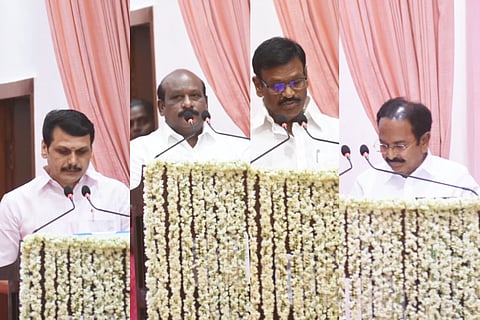

High-profile DMK leader V Senthil Balaji, who was days ago granted bail by the Supreme Court in a money laundering case, was sworn in as minister by Tamil Nadu Governor R N Ravi here on Sunday.
Balaji and three other DMK MLAs were sworn in in the presence of Tamil Nadu Chief Minister M K Stalin, his son Udhayanidhi, who had already been designated as Deputy Chief Minister.
Balaji, who was incarcerated for an extended period due to a money laundering case, and Nasar, who was removed from the cabinet last year, were both sworn in again.
The new faces in the cabinet are Govi Chezhian, the MLA from Thiruvidaimarudur reserved constituency and the current chief government whip.
The portfolios of the newly sworn in ministers were announced by the Raj Bhavan, V. Senthilbalaji, has been appointed as the Minister for Electricity, Prohibition, and Excise. He will oversee critical portfolios related to electricity and non-conventional energy development.
Dr. Govi Chezhiaan, representing Thiruvidaimarudur, has been appointed as the Minister for Higher Education, where he will focus on technical education, electronics, science, and technology initiatives.
R. Rajendran, from the Salem North constituency, has been designated as the Minister for Tourism, responsible for tourism and sugar, including sugarcane excise and development.
Lastly, S.M. Nasar, who represents the Avadi constituency, has been sworn in as the Minister for Minorities Welfare and Non-Resident Tamils Welfare. His responsibilities will include overseeing minorities welfare, non-resident Tamils welfare, as well as managing affairs related to refugees, evacuees, and the Wakf Board.
In a move that caught some by surprise, three ministers were earlier dropped from the cabinet. Mano Thangaraj, Minister for Milk and Dairy Development, K Ramachandran, Minister for Tourism, and Gingee KS Masthan, Minister for Minorities Welfare and Non-Resident Tamils Welfare, were relieved of their ministerial duties.
The reshuffle marks a significant shift in the DMK government's leadership, with Udhayanidhi Stalin’s promotion seen as a strategic move to solidify his role in both the party and state governance.
(With inputs from PTI)